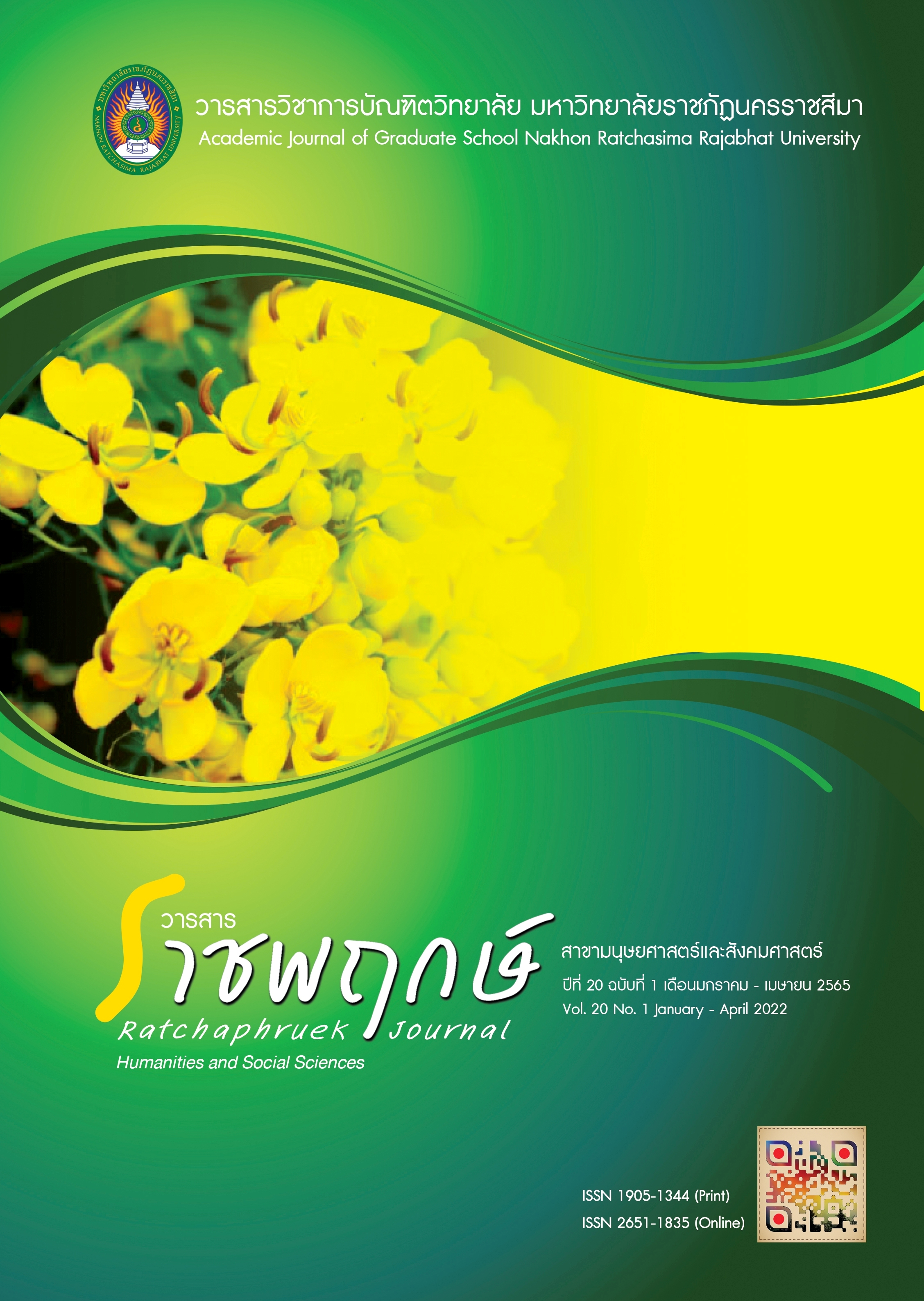The Effects of Contemplative Education Activity on Self-esteem of Hotel Employees
Main Article Content
Abstract
The purposes of this research were to compare self-esteem of 1) the experimental group before and after the experiment, and 2) after the experiment between the experimental group and the control group. The samples used in the research were hotel employees in Nakhon Ratchasima Province, who had worked more than or equal to 1 year and voluntarily participated in the research. By samples were divided into 2 groups in 10 participants each (1) the experiment group and (2) the control group. The research tools consisted of thecontemplative education activity in 2 days, 6 hours a day,and self-esteemscale which is characterized as a 4-rating scale of 24 items with a reliability of .756. The result was analyzed by t-test.
After the experiment, the results showed that
1. The experimental grouphad self-esteem scores higher than before the experiment with statistical significance at .01 level, and
2. The experimental group had self-esteem scores higher thanthe control group with statistical significance at .01 level.
Article Details

This work is licensed under a Creative Commons Attribution-NonCommercial-NoDerivatives 4.0 International License.
References
ชลลดา ทองทวี และคณะ. (2551). การสำรวจและสังเคราะห์ความรู้จิตตปัญญาศึกษาเบื้องต้น (รายงานวิจัย). กรุงเทพ: ศูนย์จิตตปัญญาศึกษา มหาวิทยาลัยมหิดล.
ณัฐกานต์ ธีระลีลา. (2563). Self-Esteem (การเห็นคุณค่าในตัวเอง). สืบค้นเมื่อ 17 พฤษภาคม 2564, จาก https://asian-identity.com/hr-egg-th/eggblog/self-esteem.
ธนา นิลชัยโกวิทย์. (2551). จิตตปัญญาศึกษา: การศึกษาเพื่อการพัฒนาความเป็นมนุษย์. ใน หนังสือรวบรวมบทความการประชุมวิชาการประจำปี 2551 กรุงเทพฯ: ศูนย์จิตตปัญญาศึกษามหาวิทยาลัยมหิดล.
บริษัท โกลบอล เพาเวอร์ ซินเนอร์ยี่ จำกัด (มหาชน). (2559). พนักงานของบริษัท. สืบค้นเมื่อ 17 พฤษภาคม 2564, จาก https://www.gpscgroup.com/th/sustainability/social/ workforce-development-and-well-being.
เบญจม์ภัทร์ แสงโสฬส. (2560). การปรับตัวของนักศึกษาระบบทวิภาคีในบริษัท แพรนด้าจิวเวลรี่ จำกัด (มหาชน) ที่มีระดับการเห็นคุณค่าในตนเองแตกต่างกัน (วิทยานิพนธ์มหาบัณฑิต, มหาวิทยาลัยราชภัฏนครราชสีมา).
ปราณี อ่อนศรี. (2557). จิตตปัญญาศึกษา: การศึกษาเพื่อการพัฒนามนุษย์ในศตวรรษที่ 21. วารสารพยาบาลทหารบก, 15(1), น. 7-11.
ปรารถนา ช้อนแก้ว. (2542). การพัฒนาความภาคภูมิใจในตนเองของเยาวชนในสถานพินิจและคุ้มครอง เด็กและเยาวชน จังหวัดระยอง โดยใช้กิจกรรมการออกกำลังกายเป็นสื่อ (วิทยานิพนธ์มหาบัณฑิต, มหาวิทยาลัยศรีนครินทร์วิโรฒ ประสานมิตร).
วิจักขณ์ พานิช. (2550). เรียนรู้ด้วยใจอย่างใคร่ครวญ. กรุงเทพฯ: สวนเงินมีมา.
วันเพ็ญ หาหอม. (2563). ผลของจิตตปัญญาศึกษาที่มีต่อกรอบความคิดเติบโตของพนักงาน (วิทยานิพนธ์มหาบัณฑิต, มหาวิทยาลัยราชภัฏนครราชสีมา).
สิริรัตน์ นาคิน. (2559). การพัฒนารูปแบบการจัดการเรียนรู้เพื่อส่งเสริมจริยธรรมสำหรับ นักศึกษาวิชาชีพครู: กรณีศึกษามหาวิทยาลัยราชภัฏนครราชสีมา (วิทยานิพนธ์ดุษฎีบัณฑิต, มหาวิทยาลัยมหาสารคาม).
Rosenberg, M. (1979). Conceiving the Self. New York: Basic Books.
Tessa, M. R. & Christine, A. W. (2011). Mindfulness, Self-Care, and Wellness in Social Work: Effects of Contemplative Training. Canada: Hull child and family services.
Weiss, A. (1995). Human capital vs. Signaling explanations of wages. Journal of Economic Perspectives, 9(4), pp. 133-154.


